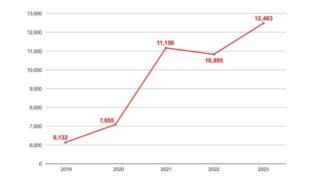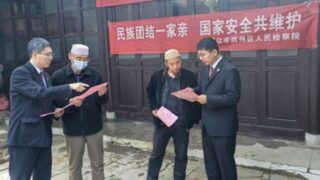Fighting human trafficking is a worthy enterprise. Weaponizing human trafficking laws to crack down on spiritual minorities and resurrect the dead horse of brainwashing theories is not. Twelve international religious liberty organizations protest.
by Bitter Winter


Dear Sirs:
We represent several leading organizations that act as watchdogs for freedom of religion or belief (FoRB) throughout the world through publications, conferences, and statements at the United Nations Human Rights Council.
We are increasingly receiving alarming reports about the situation of FoRB in Argentina and the activities of a special prosecutors’ office called PROTEX.
We understand that the aim of PROTEX is to fight human trafficking. It is an important and laudable aim, as trafficking women, men, and children who become forced sex workers or slave laborers is an internationally recognized plague.
We noted, however, some international criticism of Argentinian legislation, which in contrast with international agreements does not consider violence, threats, or deception as necessary elements of the crime of trafficking, only as aggravating circumstances.
We are aware that, in case of slave laborers or sex workers exploited by organized crime, a case law has developed internationally that regards the consent of the victims as irrelevant, as they are terrorized by their exploiters and may risk death if they testify against them.
It seems that in Argentina PROTEX misuses this understandable principle by applying it to women and men who willingly participate in religious and belief-based activities, where it is normal, in all religions, that volunteers work for free or at any rate without entering into the contracts and relationships that are typical of salaried jobs.
A vicious circle has been created where PROTEX claims that volunteers and others who have voluntarily joined religious or spiritual movements PROTEX regards as “controversial” are “victims of trafficking” and thus the fact that they deny being victims is irrelevant.
In fact, PROTEX seems to have joined forces with “anti-cultists” who believe in the pseudo-scientific theory of brainwashing, repudiated by courts of law in the United States and other democratic countries, according to which those who join “cults” are subject to mysterious persuasion techniques that put them in a situation of mental slavery.
Scholars of new religious movements have consistently denounced in the last forty years these theories as tools used to discriminate against unpopular spiritual minorities. Yet, PROTEX and other Argentinian institutions continue to promote them, raiding in a military style and prosecuting religious and spiritual groups whose members deny being victims and claim that they have joined their movements and perform volunteer work for them based on their own constitutionally protected freedom of choice. Prosecutors in Argentina continue to quote a discredited anti-cult literature, ignoring the mainline academic approach that has rejected the notions that “cults” are essentially different from “religions” as they use “brainwashing” as unprovable and non-scientific.
As typically happened in the case of the Buenos Aires Yoga School (BAYS), women have been harassed by claiming that they were exploited to work for free for BAYS, including as prostitutes. They deny ever having been prostitutes or exploited, but PROTEX’s argument is that the voice of the alleged victims of human trafficking and brainwashing is by definition irrelevant. These women, most of them professionals in their 40s or 50s, are thus truly victimized—by PROTEX. In other cases, esteemed religion-based international humanitarian organizations such as REMAR, which are based on volunteer work, have been raided claiming that, since volunteers do not receive a regular salary, they are also victims of human trafficking.
Clearly, legitimate provisions against real human trafficking are being misused to discriminate against religious and spiritual minorities that their opponents label as “cults” and accuse of the imaginary crime of “brainwashing,” as a sort of barely modernized version of the old accusations of witchcraft or controlling victims through the evil eye.
These violations of human rights and FoRB are against Argentina’s international obligations and should cease immediately. The international provisions on FoRB do not distinguish between “good” religions and “bad” “cults,” and ask that all religious and spiritual groups, popular or unpopular, be equally respected and allowed to operate freely according to their own doctrines and principles.
Bitter Winter, a daily magazine on freedom of religion and human rights
CAP-LC – Coordination des Associations et des Particuliers pour la Liberté de Conscience
CESNUR – Center for Studies on New Religions
EIFRF – European Inter-Religious Forum for Religious Freedom
Fedinsieme [Faiths Together]
FOB – European Federation for Freedom of Belief
FOREF – Forum for Religious Freedom Europe
Gerard Noodt Foundation for Freedom of Religion or Belief
HRWF – Human Rights Without Frontiers
LIREC – Center for Studies on Freedom of Religion, Belief, and Conscience
OPR – Observatory of Religious Pluralism
ORLIR – International Observatory of Religious Liberty of Refugees
Soteria International









